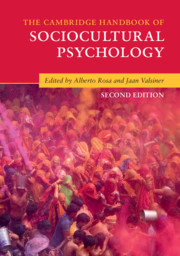Book contents
- The Cambridge Handbook of Sociocultural Psychology
- The Cambridge Handbook of Sociocultural Psychology
- Copyright page
- Contents
- Figures
- Tables
- Contributors
- Editors’ Introduction
- Part I Theoretical and Methodological Issues
- Part II Action, Objects, Artifacts, and Meaning
- Part III The Agent Rises a Reflective Self: Education and Development
- Part IV Institutional Artifacts for Value
- Part V Aesthetic and Religious Experiences
- 19 The Sociocultural Constitution of Aesthetic Transcendence
- 20 Sociocultural Science of Religion and Natural Belief
- 21 Psyche and Religio Face to Face: Religion, Psychology, and Modern Subjectivity in the Mirror
- Part VI Practices and Artifacts for Imagining Identity
- Part VII Experiences Make the Person
- General Conclusion
- Index
- References
21 - Psyche and Religio Face to Face: Religion, Psychology, and Modern Subjectivity in the Mirror
from Part V - Aesthetic and Religious Experiences
Published online by Cambridge University Press: 25 June 2018
- The Cambridge Handbook of Sociocultural Psychology
- The Cambridge Handbook of Sociocultural Psychology
- Copyright page
- Contents
- Figures
- Tables
- Contributors
- Editors’ Introduction
- Part I Theoretical and Methodological Issues
- Part II Action, Objects, Artifacts, and Meaning
- Part III The Agent Rises a Reflective Self: Education and Development
- Part IV Institutional Artifacts for Value
- Part V Aesthetic and Religious Experiences
- 19 The Sociocultural Constitution of Aesthetic Transcendence
- 20 Sociocultural Science of Religion and Natural Belief
- 21 Psyche and Religio Face to Face: Religion, Psychology, and Modern Subjectivity in the Mirror
- Part VI Practices and Artifacts for Imagining Identity
- Part VII Experiences Make the Person
- General Conclusion
- Index
- References
- Type
- Chapter
- Information
- The Cambridge Handbook of Sociocultural Psychology , pp. 380 - 396Publisher: Cambridge University PressPrint publication year: 2018

